- Home
- Robert J. Mrazek
A Dawn Like Thunder Page 6
A Dawn Like Thunder Read online
Page 6
When Waldron wasn’t running the squadron through their daily gauntlet of bounce drills and torpedo attack exercises, Tex had dated a lot of girls, mostly nurses. He was a roving and enthusiastic bachelor and enjoyed going out almost every night he was off duty. Some nights, he never had to go out at all. The girls came to the pilots.
After December 7, dashing Navy pilots became almost irresistible to the opposite sex. The opportunities were dazzling. By then, he was billeted in the new brick Bachelor Officers’ Quarters at Breezy Point on the Norfolk Naval Base. Security was lax. On Sunday mornings, there would usually be several women at the breakfast table or in one of the shower rooms.
Now the fun was over. After thinking over the Skipper’s words about tidying up his personal affairs, he decided that it would probably be bad luck to write a last letter home. Besides, if anything happened to him, his parents would be able to read the diary he had started just before the Hornet left for the Pacific.
None of his fellow pilots knew he was keeping one. Most of them wouldn’t have believed it. Squire Evans sure, but not Tex Gay. Unlike the Squire, he had never done any serious writing in college. Or reading for that matter.
One day back in February, he had found an unused daily journal in a secondhand shop and suddenly felt compelled to begin writing a diary. Since the blank journal was from 1940, he had to change all the dates to correspond to 1942. Soon he was scribbling down his thoughts and impressions at the end of each day. He called it his log, just like the one the Navy provided for him to record all of his hours in the air.
With strict censorship of correspondence enforced after the Hornet left for the Pacific, the diary enabled him to write things the Navy never would have allowed him to send home in a letter. He decided to put his most candid thoughts in it, including his assessments of the Skipper, his fellow pilots, and many of the things they experienced together as the Hornet made its way out to the Pacific.
In April, he recorded his excitement at discovering that the ship was carrying sixteen Mitchell B-25 bombers, along with a full squadron of Army Air Force pilots and crews to fly them. He quickly realized he might soon be witnessing an important moment in history.
Had a big powwow in the wardroom. Colonel Jimmy Doolittle read telegrams of good wishes from General Arnold, Admiral King, and President Roosevelt. Then he told us the target — TOKYO — Boy, oh Boy!!! . . . Things begin to make sense. Landing fields in China are already prepared, plans and dates set. . . . We even have subs lying in Japanese harbors giving us daily reports, and that calls for GUTS!!
April 18: Just east of Tokyo. We stood on the catwalks, the antiaircraft batteries, hanging from every spot to watch the planes prepare for takeoff. . . . The 2nd one stalled and almost settled in but they all made it.
With tears running down his face, Tex watched as each bomber headed west toward Japan. For the first time, America was striking back. Soon, it would be their turn, and he hoped he was prepared.
As the days had passed, he wrote of his fervent hope that the squadron’s obsolete Devastators would soon be replaced with the new Grumman TBF Avengers. He had even begun to construct a model of the TBF from a drawing he had found in the pilot’s handbook.
The squadron’s failure to receive them led to an angry entry in his diary.
Sometimes I wonder what I am doing way out here. What really bugs me is being here with such poor equipment to work with while at home, a bunch of “supposed to be” Americans are kicking about a 40-hour work week. If we had TBFs, I don’t know of a place in the world I would rather be than here with a chance to do our part.
He continued to record any hint or rumor that suggested the Avengers might still be coming.
The TBFs were in Dago [San Diego] not long ago. Hope we get them soon.
And later in May:
Still . . . don’t have the TBFs. Wonder if we will ever get them.
Now, as the Hornet drew ever closer to its rendezvous with the Japanese striking force off Midway, Tex knew they never would. Instead, they would have to fly the slow-moving Devastators and hope for the best.
In all of his months of training he had never actually launched a torpedo. In fact, he had never carried one in a plane. He had never even seen it done. They had been told that the Navy didn’t have any to spare. Now, just like most of the others in the squadron, he would be carrying and launching one for the first time. In combat.
Sitting in the ready room, Tex remembered all the times the Skipper had ordered them to fly low across the Virginia panhandle, barely clearing hedgerows and scaring the hell out of herds of grazing Herefords, pretending that a tree line was a Japanese carrier, flat-hatting in so low on the bays and inlets that the long TBD propellers would sometimes slash the surface of the water.
Every day, some farmer or fisherman would call in to complain, but Waldron always ignored them. Going in low was exactly what his boys would have to do, just as low as their guts would allow them to. That’s what it all came down to, thought Tex.
Guts.
He silently prayed he would have his share when the time came.
Bert and Harry
MONDAY, 1 JUNE 1942
LUKE FIELD
FORD ISLAND, PEARL HARBOR
0700
The rubber tire streaks on the concrete runway swept past the Avenger’s windscreen as the big plane rapidly picked up speed. Airborne, Bert Earnest glanced down to the right and glimpsed the shattered hulk of the Arizona. Off to his left, the Utah lay in its shallow grave on the north side of Ford Island.
As the flight of Avengers banked to the west, the thought suddenly struck him that he had never actually flown out of sight of land before. He wasn’t really bothered by the notion. The thought of flying more than twelve hundred miles across the Pacific didn’t concern him at all. It was a simple fact, like the powerful and reassuring roar of the radial engine in front of him.
He had less than ninety hours of flying time in the Avenger, and a solid portion of that had been logged flying across the country, but he knew the plane was good. He had no qualms about taking it into combat if that was what they were facing at Midway. She was the finest ship he had ever flown.
He moved smoothly into position off Fieberling’s left wing. Charlie Brannon came up on the right. The flight leveled off at fifteen hundred feet, and Fieberling headed west on a compass heading of 270 degrees true. The rising brilliance of the morning sun transformed the dark gray sea ahead of them into a soft aqua green.
Bert’s eyes swept the gauges on the instrument panel. Everything read normally. Inside the closed cockpit, the smells were all pleasingly familiar, from the hint of high-octane gas in the air to the pungent smell of hot metal. The plane was in perfect trim. He turned to look over at Charlie Brannon. The joker was grinning back at him. He gave him the thumbs-up.
He had no idea what was waiting for them out there, but after all the months of hard training he was finally on his way. He settled his behind onto the parachute pack, and leaned back against the molded backrest.
It seemed almost a lifetime ago that he had reported for duty to the squadron, but it had only been five months. After finishing flight school at Pensacola, his orders were to report to Norfolk, Virginia, on December 10, 1941.
He had decided to stop home in Richmond first, and was sitting with his date in the dining room of the Country Club of Virginia on Sunday, December 7, when someone called out from the men’s bar that the Japanese had attacked Pearl Harbor.
After immediately driving the girl home, he rushed to the Navy department building in Richmond, telling the officer on duty that although he wasn’t scheduled to report to his squadron for three more days, he was ready to pitch in if there was something they needed him to do right away.
The officer had grinned and said, “Ensign Earnest, it’s my fervent hope that the Navy can survive without you for three more days.”
He had trained under Waldron and Swede Larsen for almost six months. It was the most ri
gorous set of challenges he had ever undertaken, and he had survived them all. His fitness reports attested to the fact that he was one of the most naturally gifted pilots in the squadron, if not the Hornet’s air group. Even flying this brand-new airplane, he felt prepared for whatever might come.
The Avenger was almost flying itself now. His eyes found the twenty-four-hour clock on the instrument panel. They were already two hours out of Pearl Harbor. The adrenaline rush he had felt at the takeoff was slowly wearing off. That was when he realized that he had forgotten to bring the thermos he had filled with coffee just before the pilots’ meeting in CASU-5. He wondered what the rest of the squadron was doing back at Pearl. They were probably being run ragged by Swede. He was glad to be on his way.
Soon, his thoughts wandered back home to Richmond, where Bert was born on April Fool’s Day, 1917. He had grown up on Ken-sington Avenue near the Old Soldiers’ Home on the Boulevard. As a boy, he remembered, he often watched the last surviving Confederate soldiers as they dozed on the porch or rocked their chairs in the afternoon sun.
Although he had no great interest in his own rebel ancestry, his mother made sure he joined the Sons of Confederate Veterans. In high school, he developed a far more serious interest in jazz, and was one of a handful of white boys in the audience when Cab Callo-way came to perform in Richmond. It was one of his most vivid memories.
In the late 1920s, the state capital was still a sleepy Southern town. Life moved slowly there, especially in the summer heat. Richmond society still rode to the hounds in pursuit of the fox. His father, James Earnest, was the chairman of the Country Club of Virginia. He kept a stable of horses and led many of the fox hunts.
Bert was in the same class at school as the son of Governor Byrd. He was an early reader, and partial to Tom Mix stories. A very good student, he skipped two grades before following his brother Jim to the Virginia Military Institute.
Sitting in the cockpit, he found himself wondering where his brother rats were at that very moment. His best friends from VMI were in the 17th Field Artillery. Flying was definitely more fun than lobbing artillery shells, he thought.
VMI had been great, all except the midnight curfew on Saturday night, after which their weekend dates would sometimes get stolen by the Washington and Lee boys who lived a mile down the road. He remembered one of his roommate’s dates waving from the veranda of one of the W & L fraternity houses in a bathrobe as the VMI cadets marched by on their way to Sunday chapel services.
Not for the first time, he wondered why he had been one of the six pilots selected to go on the flight. Swede hadn’t said a word to him about it. Was it because he was a good pilot or because Swede thought he was expendable? Hell, they were all good pilots. Every one of them had gone through the pressure of elimination training before joining the squadron.
Maybe he had been chosen because he had flown with Swede up to the Quonset torpedo range in Rhode Island, and was one of the few men who had actually launched a torpedo. But Smiley Morgan had flown up there with them, too, and he hadn’t been picked.
He thought about the two young crewmen flying with him in the plane. They were just kids, seventeen or eighteen. He didn’t know either one of them very well. J. D. Manning, the eighteen-year-old who had been assigned as his turret gunner, was lean and strong. Harry Ferrier, the radioman-tail gunner from Springfield, Massachusetts, looked no more than fifteen. Bert might have flown with him back in Norfolk, but he couldn’t remember for sure. Pilots rarely flew with the same crews more than once on practice missions.
The way the plane was configured, there was no way for him to visually check on the crew. But if there had been a problem, one of them would have spoken up on the plane’s intercom.
He was feeling drowsy once more and unlatched the cockpit canopy, sliding it back far enough to feel a constant gust of cool air on his face. After using the piss tube to relieve himself, he took several sips of water from the canteen the plane captain had stowed near his feet. He hadn’t thought to bring any food with him, and he found he was hungry.
When his eyes ranged over the instrument console again, they were drawn to the name he had scrawled in pencil next to one of the gauges. He had written it there in large crude letters just before they took off from Ford Island.
jerry.
Jerry Jenkins. After meeting her at a party in Richmond, he thought he was probably in love with her. She was smart and beautiful, a combination he found incredibly attractive. Jerry was a very classy girl, a student at Smith College up in Massachusetts. She had promised to wait for him until he returned from the Pacific. When he did, he figured he would probably ask her to marry him. The thought that he might possibly be killed in the war never entered his mind.
He came from a military family. During the First World War, his father had enlisted in the Richmond Light Blues. One of his uncles had been a Navy aviator. His uncle Herb had served in the U.S. Cavalry. Coming back from France, Herb had decided to make the Army his career. He was now a brigade commander serving under a general named George Patton.
Bert had wanted to be a flier from the time he was ten years old. He remembered the rush of exhilaration he felt right after hearing the news on the radio that Charles Lindbergh had made it solo across the Atlantic. A few months before that, his father had taken him to see one of Lindbergh’s famous daredevil rivals, Clarence Chamberlin, at the Richmond Airfield.
As the flight of Avengers continued on their compass heading, he wondered where Lieutenant Commander Waldron and the rest of Torpedo Eight was. The last scuttlebutt he had heard before leaving Ford Island was that the Hornet was probably guarding the northwest approaches to Pearl Harbor in case of another Japanese sneak attack. It was only through a twist of fate that he wasn’t already with them.
Back in March, he had been told that he was one of the pilots who would be going with Commander Waldron when the Hornet left Norfolk. He had borrowed a footlocker and packed all of his personal gear in it for the long passage. It was already stowed aboard the carrier when at the last minute he was told that Hal Ellison, a married pilot from Buffalo, New York, was going in his place. He wasn’t told why. At the time, he had felt only bitter disappointment. As the days passed, he got over it, especially after meeting Jerry Jenkins. But he had never found out the reason for the change.
The flight of Avengers passed through a low cloud bank and rain began spattering the windshield. He kept his speed steady until they broke out of the cloud cover a minute later. He checked the clock again. They were better than halfway there.
From his cramped position in the tail of Bert’s plane, seventeen-year-old radioman-gunner Harry Ferrier had an unobstructed view through the rear gun port of the three planes following them.
Ensign Gaynier led the second element, with Darrel Woodside on his left and Vic Lewis to the right. Through the little porthole on the side of the fuselage, Harry could see Ensign Brannon’s plane, too, although he was almost completely blind to everything unfolding ahead of them. Aside from monitoring the radio, the teenager had nothing to do for the entire flight. No one had broken radio silence.
They had flown across hundreds of miles of the Pacific, but Harry hadn’t seen a single ship, airplane, or any other sign of human civilization. As hour after hour passed, it seemed as if they were the ancient mariners, the first men to explore this remote corner of the world.
The plane was a honey, the best one he had flown in since joining the Navy. Back at Pearl Harbor, one of the mechanics had told him it was the first Avenger to ever roll off the assembly line at the Grumman factory up on Long Island.
Since quitting high school to join the Navy, Harry had become a smoker, and he indulged his new habit while periodically checking his equipment to make sure it was functioning properly.
Occasionally, he looked up the passageway of the fuselage to where Jay Manning was sitting in his turret gun harness, facing forward. Unlike Harry, Jay had the best seat in the plane. He could see what was going on i
n every direction.
About eight hours into the flight, the throaty roar of the engine suddenly changed pitch, and he saw the three planes behind him shift into a single formation. That’s when he knew they had arrived somewhere and were about to land. Harry craned his head around to the side porthole and gazed downward.
Staring into the glare of the afternoon sun, it was difficult to see anything on the surface of the dazzling sea. Then the tiny hump of a sandy beach suddenly materialized below him. It was Midway Atoll.
As they came in to land, Harry’s eyes took in the landscape beyond the beach. It was flat and sandy, and there were no trees. The island was small, completely dwarfed by the vast expanse of deep blue ocean, but what he saw below the plane sent a thrill through him.
Wingtip to wingtip, the hardpan aprons along the two intersecting runways were crowded with combat planes. There were so many of them down there it seemed they would barely have room to land. In the moments before the plane touched down, Harry saw a huge B-17 Flying Fortress, a warplane he had only seen in photographs.
Taxiing off the runway, Bert came to a stop on one of the crushed coral parking aprons near the runway. The moist salty air was tinged with the reek of aviation gas as Harry climbed out of the tail compartment.
He was quickly surrounded by a crowd of naval officers, Marines, ordnancemen, mechanics, and other ground personnel. None of them had ever seen an Avenger before. One of the men joked that it looked like a pregnant Grumman Wildcat. Most were suitably impressed. Lieutenant Fieberling asked that the belly fuel tanks be removed from the planes as quickly as possible, and replaced with torpedoes.
As the ground personnel swarmed around the planes, the Avengers’ air crews were left to fend for themselves. It didn’t take more than ten minutes for Harry to learn why they had been sent out there.
The Japanese were coming. A big invasion force, with carriers and battleships, transports and shock troops, and a horde of attack planes. A few weeks earlier, Admiral Nimitz himself had come out to Midway to look things over. After that, everything had started to pop. This was it. Midway was where they would make a stand.

 Valhalla
Valhalla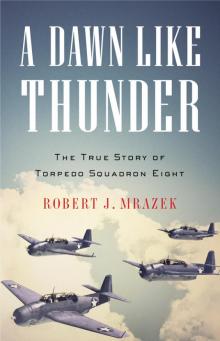 A Dawn Like Thunder
A Dawn Like Thunder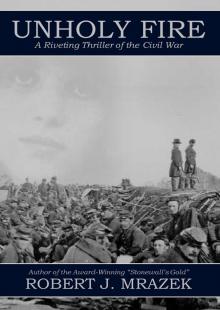 Unholy Fire
Unholy Fire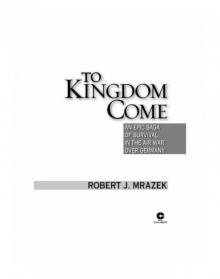 To Kingdom Come
To Kingdom Come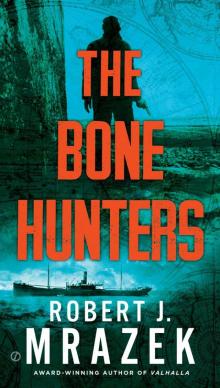 The Bone Hunters
The Bone Hunters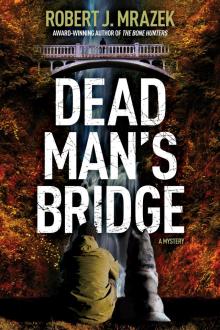 Dead Man's Bridge
Dead Man's Bridge